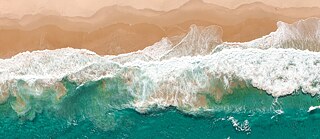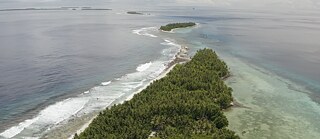UN Ocean Decade The future of the ocean

The ocean provides food, shapes weather patterns and influences the climate. Unless it is protected, sustainable development on land will not be possible. During the UN Ocean Decade, oceanographer Prof. Dr. Martin Visbeck talks about the allure of the ocean, its significance for human existence and about the urgent need for systemic solutions.
What do you find so fascinating about the ocean, which is also the focus of your scientific work?I grew up in the Lüneburg Heath, which is a long way from the sea, but I’ve always been fascinated by the ocean. I enjoyed sailing during my school years, and later on I took up surfing. After sailing trips across the Atlantic and the Pacific, I realised my passion for the sea is deeply ingrained in me. This passion eventually steered me towards a career in marine research.
The UN Ocean Decade, in which you are heavily involved, spans the years 2021 to 2030. Why did the United Nations launch this long-term initiative?
The UN Ocean Decade is dedicated to promoting research and international cooperation to address global ocean challenges and opportunities inherent in our oceans. The United Nation’s central promise to “leave no one behind” underscores its commitment to engage all countries and communities, especially regions with limited resources. By facilitating the exchange of knowledge between North and South, the initiative identifies and promotes sustainable development pathways.
What role do island states like Fiji and Kiribati, which are highly dependent on the sea, play in this initiative?
Small island states often view the ocean as an economic lifeline, hence their focus on its utilisation rather than on its protection. The challenge lies in balancing the two. How can we use the ocean in a sustainable way but at the same time protect it? These regions face specific dilemma that require global consideration. It’s crucial that we look beyond the traditional environmental concerns such as overfishing, pollution and climate change. It is precisely this area of tension, striking a balance between ocean protection and utilisation, that lies at the centre of the Decade.
From your perspective, what are the most significant gaps in knowledge in ocean research?
The biggest gaps relate to depths below 100 metres. Despite technological advances that provide surface data, the depths of the ocean, including the seabed, remain largely unexplored because these regions are difficult to access. Human use of the ocean, however, takes place mainly in coastal regions, and these are much more accessible. The challenge is to promote sustainable practices, combat land-based pollution and prevent overfishing. The Decade aims to explore more sustainable food alternatives such as shellfish and seaweed, while simultaneously establishing effective ocean governance to minimise overexploitation.
On land, we can’t just develop or use arable land wherever we want to. What is the situation with the sea? Are there rules that dictate where fishing or infrastructure development can take place in order to protect marine life and promote the sustainable use of the ocean?
There is a lack of structured regulation like that for the sea. Only tools such as marine spatial planning help us to sustainably use and protect our seas. The sticking point is that we often lack the data needed to deploy these tools correctly. Unlike atmospheric research, which helps government institutions make weather forecasts, our understanding of the sea is still not very advanced and we often rely on incomplete data, which leads to suboptimal decisions.
What is special about the UN Ocean Decade?
The UN Ocean Decade adopts a holistic perspective, considering the ocean as an interconnected system rather than focusing on individual aspects like climate or pollution. This systemic approach helps us to better understand and protect the ocean. By using the Digital Twin Ocean platform, which I am working on, we can test “what-if” scenarios and plan more effective strategies to use and protect the ocean. I hope initiatives like this will also increase our motivation to observe and understand the ocean more comprehensively – so that we gain a better understanding of this vast, interconnected system. Obviously, this is not something a single country, research institution or university can do alone. We can only do this globally. That’s why we need the Ocean Decade.
Moving away from the broader perspective, let’s focus on specific highlights of the Ocean Decade, such as the conferences in Barcelona and Athens in April 2024. What are these all about?
The UN Ocean Decade started in 2021, in the middle of the pandemic. Originally, the opening conference was supposed to take place in Berlin, but then it was held virtually. The Decade aims to achieve seven outcomes and ten targets through 80 global programmes and almost 300 projects worldwide. Representatives of these programmes and projects are coming together in Barcelona to assess progress made to date, discuss common challenges and increase awareness of the Decade.
Let’s look ahead to 2030 – the year UN Ocean Decade ends. How do you see the future of marine research, particularly in terms of political measures and recommended actions?
Our objective is to bring about a shift in mindset amongst the coastal states by 2030. First and foremost, this means acknowledging that the ocean is not an inexhaustible resource, but that it is a limited one requiring appropriate management, just like land. Imagine if we tried to reduce accidents solely by banning cycling. This wouldn’t address the underlying traffic issue, would it? What we need is a holistic approach! We’re also trying to raise awareness of the ocean’s vital significance for us all. Many people are unaware of its central role for our livelihoods: 95 percent of commercial goods are transported by sea, 98 percent of the world’s internet traffic passes through undersea cable systems. This is why we want to promote ocean literacy, in other words, a fundamental understanding of the different dimensions of the ocean and its relevance to our lives. This understanding serves as the cornerstone for political decisions aimed at safeguarding the ocean and increasing its importance.


